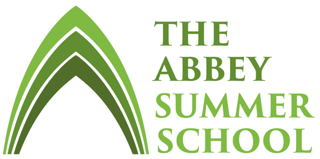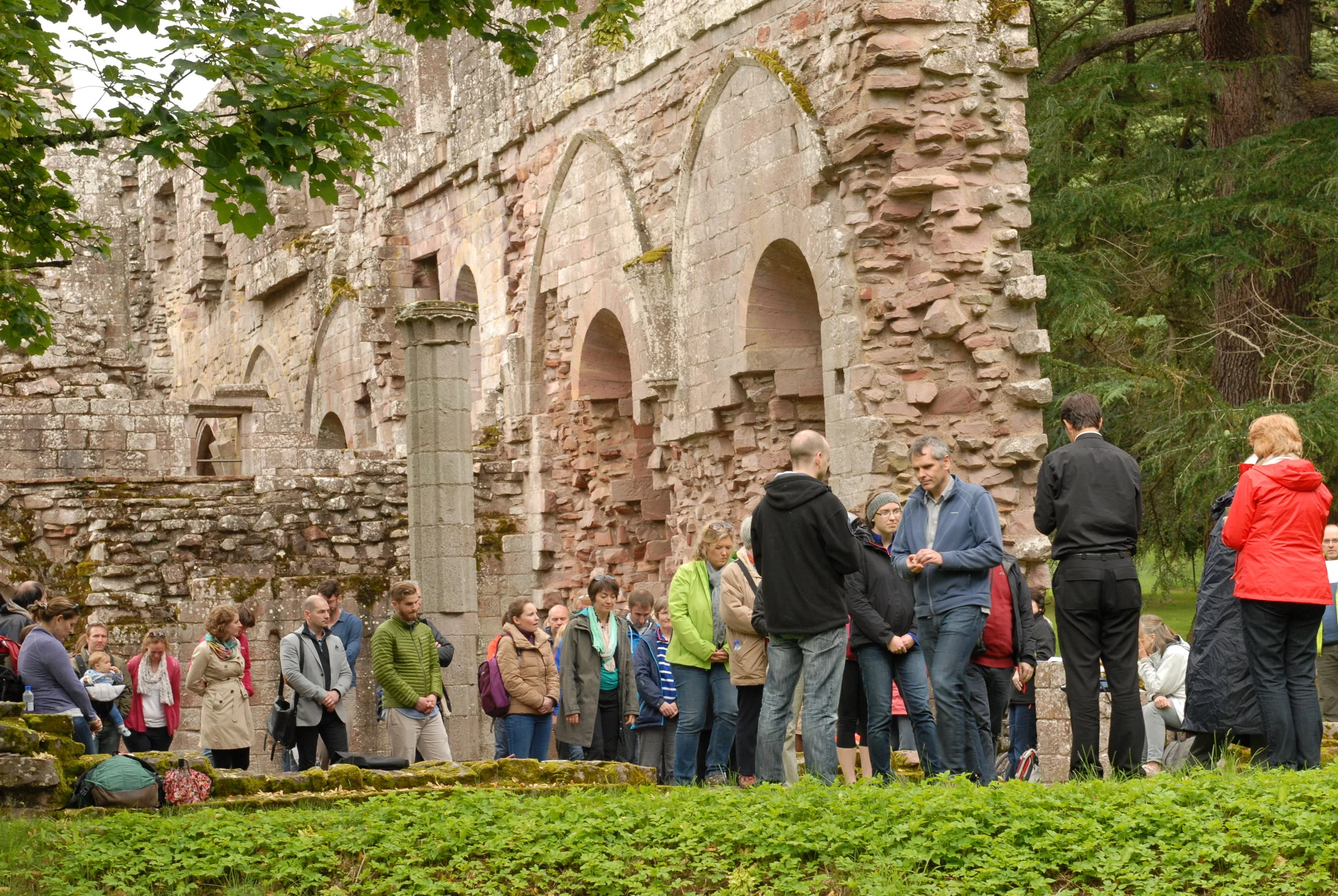The ‘abbey’ in our name indicates our ethos: we gather in a particular place, and are attentive to that place. We seek God together in community, even if only for a brief time. We want to be attentive to both heart and mind. Our participation depends on a journey we have each undertaken – a pilgrimage that is both a lifelong journey as well as a more limited and recent relocation. All of this takes on substance not only in eating, learning, and praying together on site, but in a mini-pilgrimage that we build into the Summer School – often to an actual abbey.
The ‘place’ in which we gather is always Scotland, and hitherto always Edinburgh. We hold Scotland close to our hearts, looking to strengthen her people’s faith in the midst of difficult times as we gather to worship the Triune God, to hear his word to us, and to be transformed. Scotland has been a land of the Gospel of Jesus Christ, deeply marked by its wisdom and power, for generations – a land shaped very much for the better by Christian faith, which first brought to it such benefits as high-quality education for both rich and poor, and a land that has sent out many to proclaim that faith in other parts of the world (most famously, David Livingstone). We hope to play our small part in making Scotland a land of the Gospel once again. Like all true abbeys, however, ours is a hospitable place. Built in Scotland, it is welcoming to pilgrims from all over the world. Founded with Scots primarily in mind, it opens its doors to all God’s people – all who want to gather to think in fresh ways about their faith and what it means for their lives.
What kind of event is The Abbey Summer School, then? It is something between a conference and a festival (with a little bit of think-tank thrown in). Our aim is to reach towards the integration of thought and emotion, head and heart, spirituality and theology, as found in monastic abbeys before the split into abbey and university – back in the time of Columba at Iona, or Cuthbert at Melrose and Lindisfarne. Therefore, we offer much more than just an academic summer school, although we do not offer less than that. We take seriously the minds that God gave us, but also the bodies with which they are united; the reason with which our Creator has endowed us, but also our imaginations and our emotions. There will be time to be at peace, for spiritual guidance, for laughter and for music, for worship and reflection, and for interaction and discussion. We can’t promise you a life-changing experience, but we think it’s possible.
Pilgrimage - One Foot in Front of the Other
Pilgrimage is a central part of The Abbey Summer School, in that it moves us out of our heads and into our lives and onto our feet. Although our faith rests upon God’s own incarnation, our modern tendency is toward excarnation: the reduction of Christ and our sacramental faith to propositions and ideas. By incorporating pilgrimage into the rhythm of our studies, our desire is to heed (and reverse) the lament of Scottish poet Edwin Muir: the Word-made-flesh here is made word again. Our goal is to acknowledge the embodied dimensions of faith, by not spending every minute cramming our heads full of knowledge. Instead, by incorporating prayer with walking, conversations with others, sacred geography, and the Lord’s Supper, we take seriously the body of Christ – and our own bodies.
The origins of Christian pilgrimage are no coincidence: in the fourth century debates about the incarnation raged across Constantine’s empire, causing ordinary Christians to take the challenge of Christ’s embodiment in earnest. Within a few decades, pilgrims began in earnest to travel to the holy land – to grapple with the ramifications that God himself took on a certain body, in a certain town, in a certain ethnicity, in a certain decade. This dawning realization began to encourage people that the physical world was indeed good, that the secular had become sacred, and that the physical world could be a place where we meet God. And so people began to go back to the very ordinary places that had ‘held God’ – Bethlehem, Nazareth, a tomb – and worship the God who offered himself to us not by leaving the world, but by becoming part of it.
This is the God who, in addition to giving us teaching to follow, also gave us a meal to be eaten and with people who he called his brothers and sisters. In appointing physical ways for us to be with him, God reveals our highest call which is to integrate all of our physicality with our spirit. As Martin Luther pointed out, ‘The Spirit cannot be with us except in material and physical things such as the Word, water, Christ’s body and in his saints on earth.’ Pilgrimage is an ancient practice developed precisely because it honoured body and spirit, and their interrelation. As much as we need deep interiority, there are also a whole host of things we do with our bodies that put us in touch with our incarnate Lord who himself mediated all of creation and (lest we be tempted to forget!) has a body right now. And so if I am to grow, it needs to be in ways that are connected to his physical, ascended body. And if I am to find unity with people, it needs to be in ways that plug into the risen Christ – ways which are so simple that we eschew them, because they are so physical. Bread. Wine. Other ordinary believers.
Pilgrimage, by its very nature, takes time and place. Pilgrimage honours the fact that our bodies participate in our redemption. We can be nourished spiritually by this good earth, by physical things we do within it, because creation is in the sphere of Christ. This is why it is important that we spend time with Christians in the past who have radically different expectations not only of church but of the physical realm for spiritual life.
Although the original purpose of pilgrimage was empathetic (to be able to enter the life and sufferings of Christ more deeply), it came to be that one of the most common and least celebrated functions of pilgrimage in the medieval church was pastoral. There are hundreds of accounts of bereaved women who were directed by compassionate priests to go on pilgrimage to literally walk off their grief. To clear their heads. To move out of obsessive thinking and into the healing rhythms of physical exercise. In those days, body and soul were tacitly assumed to be very much linked in one’s spiritual life. For these women who could not shake the disorientation and depression of miscarriage, infant death, and widowhood, their priests encouraged them to begin by placing one foot in front of the other. Their immediate goal was not spiritual merit but the surrender to the present moment as a way of moving them out of their current paralysis. What awaited these women at the end of their pilgrimage was a reminder that in this life there can be transformation. They often walked to the shrines of female saints, women whose lives were hard but blessed with the presence and power of God. Like reading the story of Mother Teresa or seeing a film about Bonhoeffer, the shrine at the end of the walk featuring a real person was a reminder that the divine life wants to break in on our ordinary, troubled lives.
Even though the pilgrimage at the end of The Abbey Summer School is but a nod to these vast medieval undertakings, it too stands to confront us in our own era which would see this as irrelevant for our spiritual life. All physicality has been blessed in the incarnation, redeemed at the cross, and can be a door to God’s presence due to the ascension. Pilgrimage as a practice reminds us that to be a worshiping human is not something we do purely with our minds, but also with our bodies and their affections, in physical places, in particular cultural contexts. As Paul writes to the Romans, ‘Take your everyday, ordinary life – your sleeping, eating, going-to-work and walking-around life – and place it before God as an offering’ (Romans 12:1, The Message). This is our spiritual worship.
Prayer - A Listening Posture
Modern life is making it more and more difficult to listen. This means it is becoming more difficult to pray. Prayer begins with listening. Prayer begins by listening to God’s word in Scripture, listening to God’s people in our lives, listening to Christians across continents and across centuries and to the traditions they have handed down. In all these ways we listen to what God is doing, has already done, and promises to do. Together we listen to what the Holy Spirit is saying to the churches, and to every open ear.
He wakens me morning by morning,
wakens my ear to listen like one being taught.
The sovereign Lord has opened my ears. – Isaiah 50: 4 – 5
The Abbey Summer School has been designed to help form us in a listening posture so that in Christ, by the Spirit, we can hear the Father’s love. By first resting as God’s children, we can then begin to discern his activity in our lives. We each begin responding to his particular call in ways that make us more human, not less. For the glory of God is a human being fully alive.
To practice being more alive in Christ, or to ‘practice resurrection’, our retreat takes three days. Each day is designed to balance lectures and panel discussions with practicums, and time alone with time together. Our mornings are more weighted with teaching and reflection, with our afternoons engaging our faith in practical workshops, contemplation, outdoor excursions, art, food, and more. The final afternoon gets all of us up on our feet and moving as pilgrims to a final site for Communion. Each step of the way we will be opening our ears, hearts, and finally our mouths to partake of God’s word made flesh in Jesus Christ.
You may wish to bring a friend or colleague who can listen with you on retreat. Each day there will be opportunities to reflect on what you are learning. We suggest bringing someone who can help you live out back home what you learn at the Abbey School. Bring someone who is a good listener, but don’t worry if you come alone. God is the best listener of all. He will provide what and who you need upon arrival.


